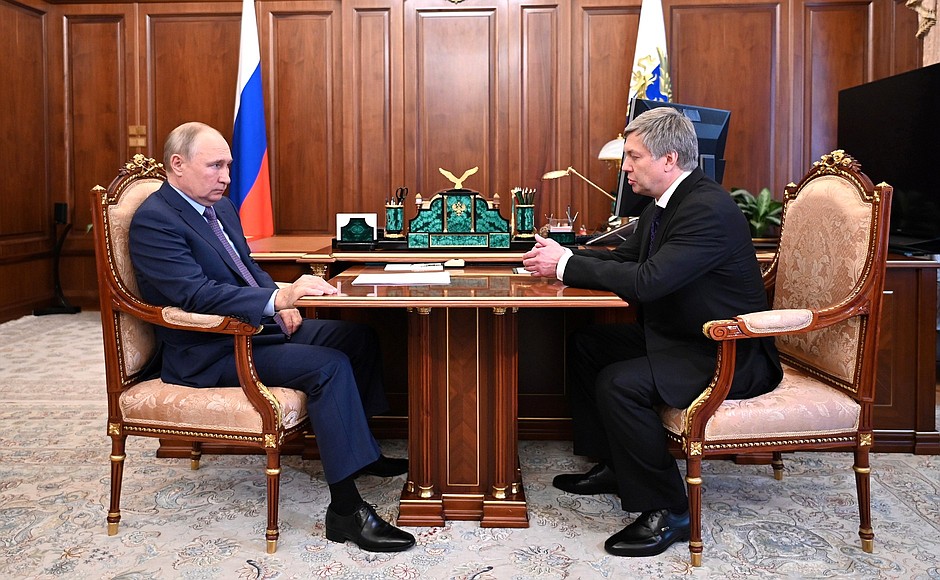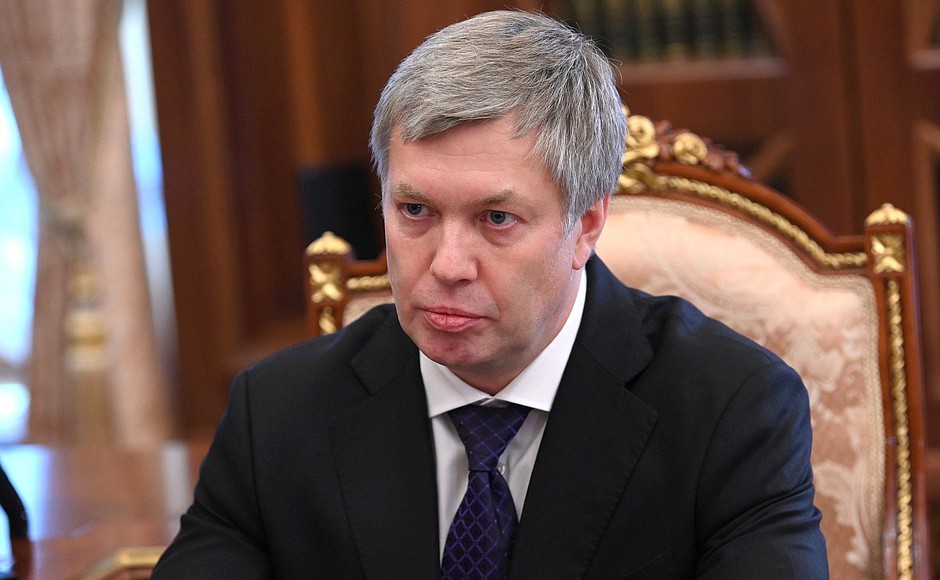At the beginning of the meeting, the President noted that the Ulyanovsk Region ranked among the developed territories in economic, industrial and social terms but numerous high-priority matters had accumulated, which he suggested discussing to start with.
First of all, Alexei Russkikh spoke about the local COVID-19 situation which became most complicated in December 2020 and January 2021 when 280 new cases were recorded daily. The situation has now peaked and is under control. In all, 44 vaccination centres have been opened, and there are plans to vaccinate 60 percent of the region’s population, a required level, by the end of October.
The Acting Governor noted that in his opinion, the region has substantial prospects. The Trans-Volga economic zone boasts virtually the leading positions in the country and accounts for 17 rubles of tax proceeds and 25 rubles of private investment per ruble of state investment. The port economic zone has 35 active residents. Six new production facilities are to open this year, and four new plants are under construction.
According to Mr Russkikh, the gross regional product (GRP) has been growing by at least five percent over the last five years. It totalled 320 billion rubles in 2016 and reached 420 billion rubles in 2020. The same can be said about tax proceeds, which soared from 35 billion to 56 billion rubles last year.
However, the Governor noted that despite this economic growth, many problems remained, above all in the social sphere. These included demographic problems as the region loses 8,000 people annually due to migration to other areas and because mortality rates exceed birth rates. The regional authorities are actively addressing this problem, which is serious. Another problem is drinking water. Prime Minister Mikhail Mishustin has visited the region, and several other ministers arrived later to assess the problem. Experts are moving to design an aqueduct that will provide better water than the one from the Volga River. In Soviet times, a “lens” with a large supply of water was discovered 40 kilometres from Ulyanovsk, and an aqueduct linking the city with that area, will effectively solve this problem.
Alexei Russkikh went on to highlight two issues the region is facing. The first concerns soil creep on the right-bank part of Ulyanovsk. This poses a threat to some 100,000 people living there, and the creep is approaching residential buildings. The regional government has outlined ways of resolving this issue by reinforcing the coastline and providing for water removal at the top. The second issue deals with low household incomes. The average salary is 32,000 rubles, one of the lowest in the Volga Federal District, and in Russia in general. Here as well, a plan of action has been outlined and efforts are already underway.
Vladimir Putin said that the region needed new, well-paying jobs, new manufacturing sites, capital and private investment.
Alexei Russkikh noted that this was precisely the way he viewed his mission. He referred to the example of Aviastar. This year it will have built only five Il-76 planes, but its goal is to reach an annual capacity of 12 planes. The MC-21 airliner has great prospects: it is in the Ulyanovsk Region that the wings, tail units and fuselage elements are made in cooperation with Irkut Corporation. This is a very promising project. With 8,000 people working on the site, there is currently a shortage of workers. Another 4,000 workers will have to be recruited within the next few years. New businesses are expected to open in the port special economic zone, creating another 1,300 jobs in 2021 and 2022 with an investment of about 16 billion rubles.
Vladimir Putin highlighted another issue the region is facing: the defrauded homebuyers. The President said that the region must act in line with the relevant federal programmes and reach out to the affected people.
Alexei Russkikh reported that a roadmap and a solution were ready for almost all unfinished housing. The defrauded homebuyers’ fund will invest about three billion rubles in order to complete construction, and the issue will have been solved by the end of 2023.
Other matters mentioned during the meeting included upgrading passenger transport, construction delays, in particular, in private home construction. The President stressed that the authorities have to help people with allocation of land plots, cut red tape when making such decision, help with infrastructure development.
Alexei Russkikh also touched upon the topic of territories once occupied by army warehouses that burned down several years ago. This land could be used to develop the city and build new residential neighbourhoods. This question had already been discussed with the Defence Ministry, the Governor pointed out. Vladimir Putin promised his support, since this would be a good, promising project to develop the city and its social infrastructure.

